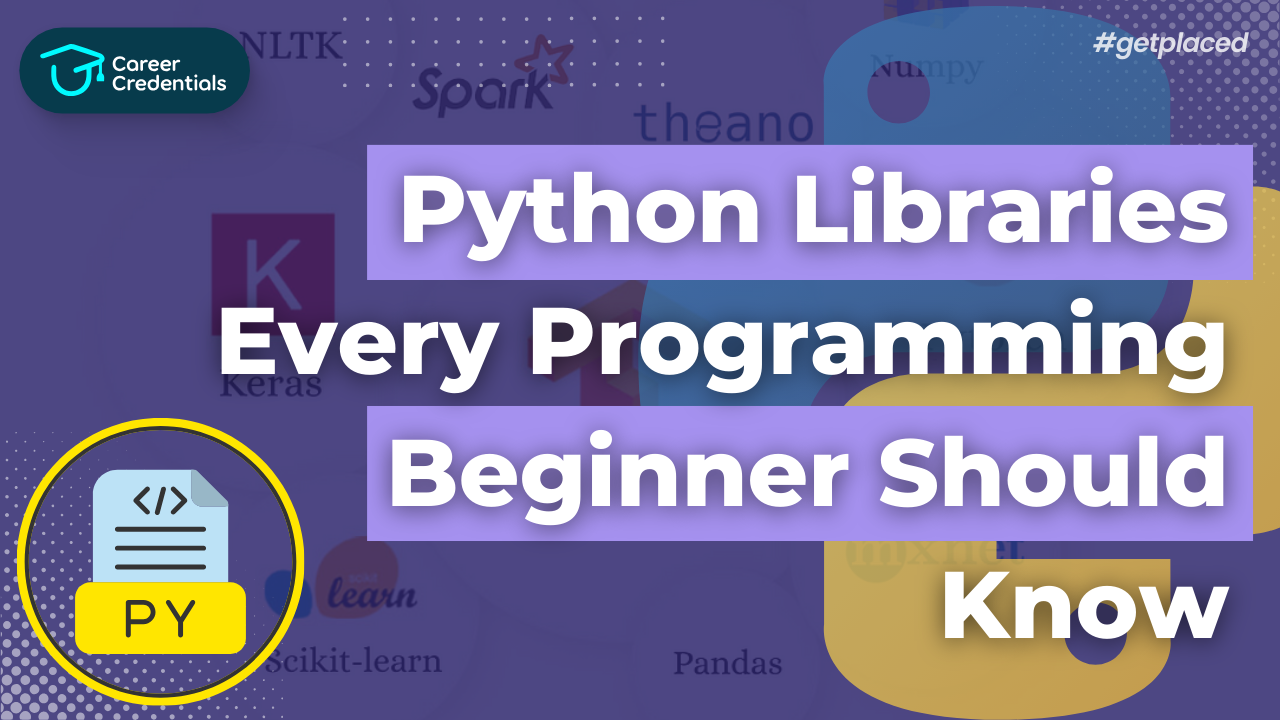Python Libraries Every Programming Beginner Should Know

Are you new to the world of Python programming? Exciting times lie ahead! Let's equip you with some essential tools to kickstart your journey. Here are seven must-know Python libraries, explained in simple terms with examples:
1. NumPy: Your Numerical Wizard
Imagine you have loads of numbers to work with. NumPy helps you handle them like a pro. It's like a magic wand for arrays—collections of numbers. With NumPy, you can do cool stuff like finding square roots of all numbers at once. Check this out:
import numpy as np
numbers = np.array([1, 4, 9, 16])
sqrt_numbers = np.sqrt(numbers)
print(sqrt_numbers)
Enroll Now: App Building using Python by Dr. Amar Panchal and Start Building Your Own Cool Stuff !
2. pandas: Your Data Wrangling Sidekick
Got data to analyze? pandas is your go-to buddy. It's like having a superpower for working with tables of data, like Excel sheets. Let's say you have a grades spreadsheet:
import pandas as pd
grades_df = pd.read_excel('grades.xlsx', index_col='name')
print(grades_df.mean(axis=1))
3. matplotlib: Your Visual Storyteller
Ever wanted to make cool charts? matplotlib is here for you. It's like an artist's palette for creating visual masterpieces from your data. Check out how easy it is to plot a simple graph:
import matplotlib.pyplot as plt
x = [1, 2, 3, 4]
y = [10, 15, 13, 18]
plt.plot(x, y)
plt.show()
Check Out: 100 Most Asked Python QnA by Career Credentials for FREE !!
4. os: Your Digital Navigator
Need to find, move, or change files on your computer? That's where os comes in handy. It's like having a map to explore your computer's folders. Here's how you can list files in your current folder:
import os
current_directory = os.getcwd()
file_list = os.listdir(current_directory)
print(file_list)
5. datetime: Your Timekeeper
Working with dates and times can be tricky, but datetime makes it easy. It's like having a special clock just for your code. Let's see how many days have passed since a special date:
import datetime as dt
birthday = dt.datetime(2000, 1, 1)
days_passed = dt.datetime.today() - birthday
print(days_passed.days)
Enroll Now: Learn Django with Prashant Sir and level up your web dev game !
6. statsmodels: Your Statistical Assistant
Statistics can be daunting, but statsmodels is here to help. It's like having a stats expert by your side. Let's say you want to fit a regression model:
import statsmodels.api as sm
import numpy as np
X = np.array([1, 2, 3, 4])
y = np.array([2, 4, 6, 8])
model = sm.OLS(y, X).fit()
print(model.summary())
7. scikit-learn: Your Machine Learning Companion
Ready to dive into machine learning? scikit-learn has your back. It's like having a guide to the world of AI. Let's load a famous dataset and get started:
from sklearn.datasets import load_iris
iris = load_iris()
X = iris.data
y = iris.target
print(X.shape, y.shape)
With these seven powerful libraries in your toolkit, you're ready to conquer the world of Python programming. Happy coding!
Check Out: Python Notes by Career Credentials for FREE !!
Confused About Your Career?
Don't let another opportunity pass you by. Invest in yourself and your future today! Click the button below to schedule a consultation and take the first step towards achieving your career goals.
Our team is ready to guide you on the best credentialing options for your aspirations.
Let's build a brighter future together!
Empower Yourself. Elevate Your Career at Career Credentials Where Education meets Ambition.
